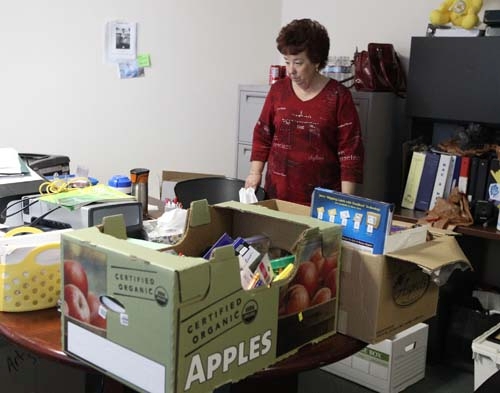Charter school for deaf signs off in bankruptcy
Caroline Bass sinks behind a mountain of markers and student artwork and watches as her charter school is disassembled Thursday.
Workers from the Clark County School District repossess computers, whiteboards, desks, chairs and a copy machine.
She musters only two words. "It's sad."
The Las Vegas Charter School of the Deaf, in the northwest valley, went bankrupt this summer after just three school years, said Bass, who's on the board of the school that took 10 years of planning to open. Even worse, board members are now $90,000 in debt because of the school's costs, which government funding didn't come close to covering.
In Nevada, charter schools are funded to fail, said Bass, who's too exhausted to play nice. Her board realized that at the start, as do founders of most of the state's 31 charter schools.
About 90 percent of Nevada charter schools rely on donations in addition to state funding, said Danny Peltier, administrative assistant at the Nevada State Public Charter School Authority.
Charter schools are public, don't charge parents, and aren't under control of a school district. They're autonomous and operate through a charter from the state or a school district, but must still meet student performance standards. If not, their charter could be revoked.
Of the nine Nevada charter schools that have closed since 2000, none were for poor student performance, but for financial problems or bad record keeping.
Student performance was never a problem for the deaf school's 11 students, Bass said. Students came in grade levels behind and caught up, she said.
"The kids were doing really well here," said Bass, noting that most students have returned to other Clark County schools. Some parents did choose to move out of state to find another deaf school, she said.
The defunct charter school, on Gowan Road near Cimarron Road, was the only deaf school in the state.
"We're still getting calls from parents considering moving to Las Vegas for the school," she said.
The state provides about $5,000 per student to charter schools. For the deaf school, that amounted to about $55,000 a year at its peak, which wasn't even enough to pay its two teachers, an aide and a director.
"You can't operate a school on that. It's ridiculous," said Bass, who's not deaf but signs as she talks. Sign language was her first language. Both her parents are deaf.
The $5,000-per-student funding rate is the same at normal public schools, but charter schools have to start from scratch, finding a building, books and equipment.
"Your money is eaten up immediately," Bass said.
That's especially true at a school as small as the deaf school, where state funding doesn't cover operational costs, said Dan Tafoya, coordinator of the Clark County School District's Office of Charter Schools.
"You need a large number of students to stay operational," said Tafoya, noting that the district's smallest charter school is the Delta Academy, which has 225 students. Odyssey Charter School has about 1,500 students. "You really have to watch your P's and Q's."
The district sponsors seven charter schools, and all are financially sound, he said.
Before opening, the charter school for the deaf received donation commitments from four people totaling $100,000 a year for five years. The school got its $100,000 in 2008, but three donors dropped out in 2009 because of the recession. In 2010, the school struggled to find donors. Board members threw in thousands each. But that only staved off the inevitable.
The school has been closed all year, but the board members just discovered they can't sell their equipment to help pay its $90,000 debt. The school district won't let them. Tafoya said state law does not allow the charter school to sell the equipment. State law says that school property will be kept by the state as "repayment of all money received by the charter school from the state."
"This makes no sense," said Bass, noting that most of the school's debt is to the state for payments into its public employees retirement system. "Those things could have been sold to pay the debt to the state. Now, we really don't have any money. Thank you very much."
Tafoya said the equipment will be dispersed among the other seven charter schools that the school district sponsors.
Contact reporter Trevon Milliard at
tmilliard@reviewjournal.com or 702-383-0279.






















